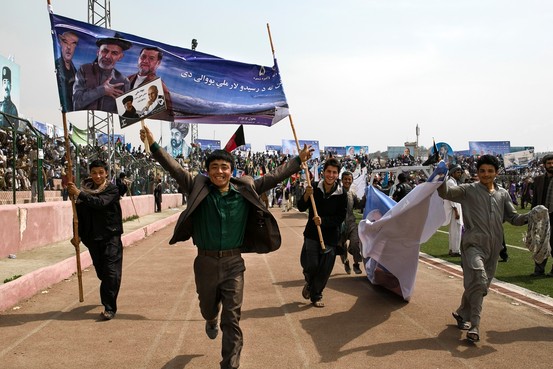Youth Hold Key to Election in Afghanistan
< < Go Back
Almost Two Thirds of Afghans Are Under 25.
For Afghanistan’s “Generation America,” Saturday’s presidential election marks a vital rite of passage.
Almost two thirds of Afghans are younger than 25, and millions have come of age during the 12 years since U.S. troops and development dollars arrived. Despite a violent Taliban insurgency and rampant corruption, young Afghans have enjoyed unprecedented freedoms and opportunities, and many of them will be voting for the first time to preserve them.
A smooth election is hardly ensured. On Wednesday, a Taliban suicide bomber detonated his explosive vest at the entrance to the ministry of interior, killing six officers in one of central Kabul’s most heavily guarded spots. An election critically disrupted by the Taliban—or stolen through fraud—could push Afghanistan into renewed civil war, reopening old ethnic fissures and imperiling many gains of the past decade.
As Afghanistan prepares for the first transfer of power since the U.S. installed President Hamid Karzai in 2001, the vote will determine whether the gains of the American era will be sustained after most U.S. troops go home in December.
Of the three presidential front-runners, former Foreign Minister Zalmai Rassoul, 70, is Mr. Karzai’s favorite and is seen as the establishment candidate. The two others, former World Bank executive Ashraf Ghani, 64, and former Foreign Minister Abdullah Abdullah, 54, have chosen running mates who were warlords during the country’s civil war.
All of them, however, are working hard to woo the young vote.
For young Afghans in particular, the vital question is less which candidate wins than whether the election comes off without triggering greater conflict. “For the new generation, it is about survival. It has the most to lose if the country reverses,” said Lotfullah Najafizada, the 27-year-old head of the Tolo News TV network, which organized boisterous debates among the candidates.
The role of Afghanistan’s new generation is likely to scramble the country’s traditional electoral politics, where votes were largely cast based on candidates’ ethnic affiliation and much of the electorate was controlled by warlords and tribal chiefs.
“Our elders think: Since he is Pashtun like me, I will vote for him. But young people are not looking at this,” said an 18-year-old high-school student, Shagofa, who dreams of becoming a surgeon. “I don’t want to vote for someone who is from my province. I want to vote for someone who is from Afghanistan.”
More From The Wall Street Journal (subscription required):




